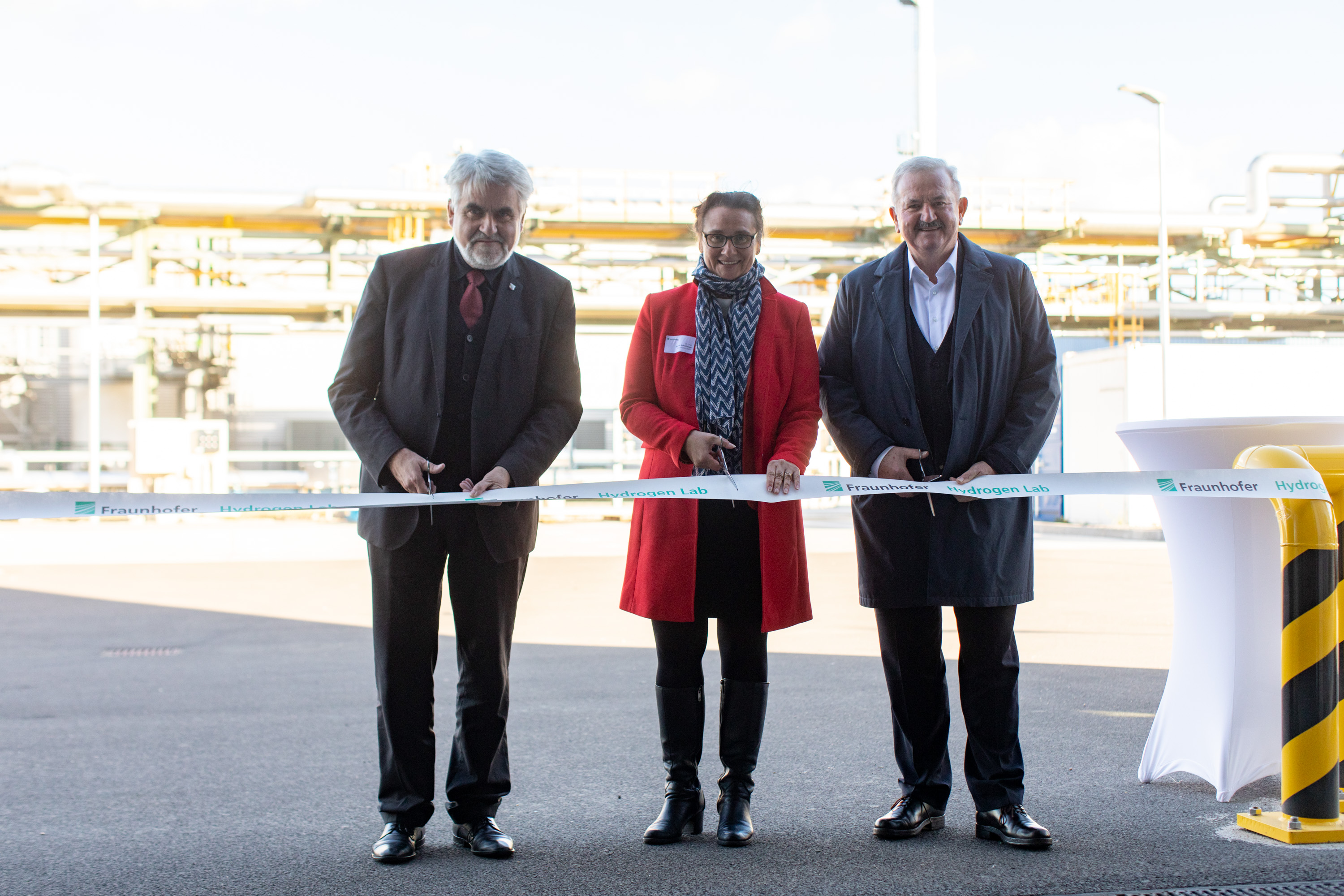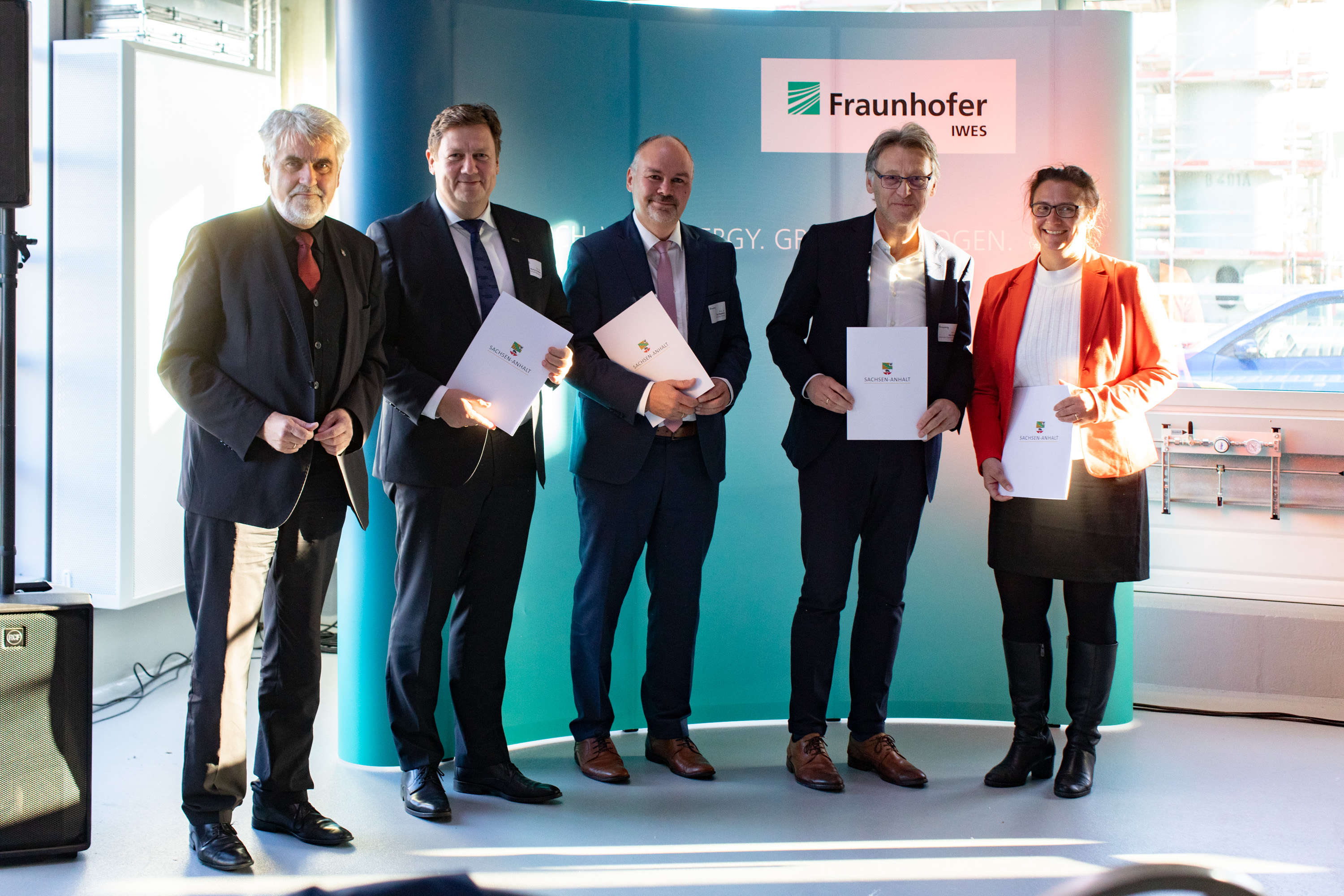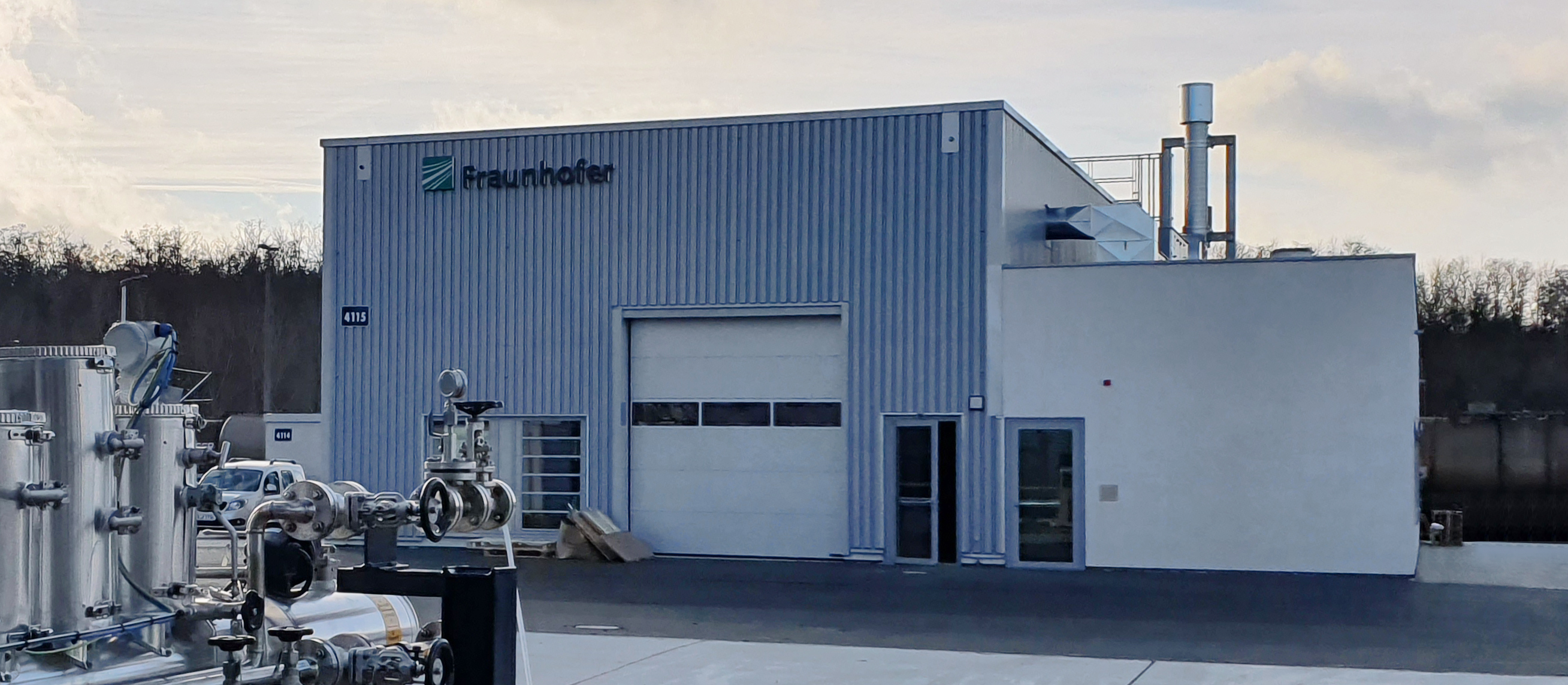Fraunhofer IWES: Hydrogen research at the Hydrogen Lab Leuna
Green hydrogen: Hydrogen Lab Leuna opens in Leuna Chemical Park
Leuna, November 2, 2022 – Prof. Armin Willingmann, Minister of the Federal State of Saxony-Anhalt, and Prof. Reimund Neugebauer, President of the Fraunhofer-Gesellschaft, officially handed over the Hydrogen Lab Leuna (HLL) building to the Fraunhofer Institute for Wind Energy Systems IWES in the Central German mining region in the scope of the “Fokusreise Strukturwandel” (Structural Change Focus Journey). In addition, Prof. Willingmann also presented the funding notification for the Hydrogen Competence Hub structural change project – a central hub for education and training.



With the Hydrogen Lab in Leuna, Fraunhofer IWES is setting the course for innovative research and development for the production and use of green hydrogen in the chemical industry. Hydrogen is a key element for raw material supply in the chemical industry, and defossilization, i.e., the changeover to green hydrogen along the entire process chain, is essential for the achievement of the climate goals. Prof. Willingmann, the Minister for Science, Energy, Climate Protection, and the Environment of the Federal State of Saxony-Anhalt, officially opened the HLL in the Leuna Chemical Park together with Prof. Neugebauer, President of the Fraunhofer-Gesellschaft, following a planning and construction phase spanning several years. “The Hydrogen Lab in Leuna will accelerate the urgently needed market ramp-up of hydrogen technologies in Saxony-Anhalt and beyond. The highly innovative research facility will make a significant contribution to Saxony-Anhalt’s ability to develop into a new powerhouse of a sustainable hydrogen economy. The development of the hydrogen economy is furthermore an important element for the successful shaping of the structural change in the region. By funding the Hydrogen Competence Hub education and training project, we are also actively combating the shortage of specialists and managers in cooperation with the Merseburg University of Applied Sciences, the Otto von Guericke University Magdeburg, and the Anhalt University of Applied Sciences,” said Minister Prof. Willingmann. This will attract not only regional companies but also international project partners and industrial customers for Leuna.
“With the building of the chemical and hydrogen hub in Leuna, which has already been a prosperous nucleus for successful cooperation between science and industry for several years, the Fraunhofer-Gesellschaft is demonstrating efficient ways not only for the energy transition, but also for successful structural change in the Central German mining region. One of three Fraunhofer Hydrogen Labs located across the country, the Hydrogen Lab Leuna focuses on research along the hydrogen production value chain. The green hydrogen produced there will be analyzed, processed, and fed directly on site into the 157-km-long H2 pipeline, from where it will be distributed to the industrial sites in the region and employed in chemical processes. The new Hydrogen Competence Hub will also address a fundamental challenge affecting all mining regions: the shortage of skilled workers and managers. Here, too, the Fraunhofer-Gesellschaft is making an important contribution to structural change through education and training,” explained Prof. Neugebauer, President of the Fraunhofer-Gesellschaft.
Construction of the pilot plant required for the research work at the HLL is complete, and it is being handed over to Fraunhofer IWES by the Federal State of Saxony-Anhalt with the official opening. The interior of the pilot plant is currently being equipped with the requisite lab facilities and equipment, which did not form part of the HLL construction project. “We are delighted that we can officially take over the HLL and thus have a place to develop our extensive test infrastructure. However, the pilot plant is already fully utilized, meaning we now have to start thinking about expansion measures. The scientific work on the first projects has also already begun, and we are on the way to a sustainable hydrogen economy in the Leuna Chemical Park, which we will support actively on the research side. In this context, we would like to express our gratitude for the funding notification for the Hydrogen Competence Hub, with which we are making our contribution to developing and maintaining the urgently needed skilled workforce together with the universities in the region. With the hub, we are striving for increased transfer between vocational and scientific further education in order to be able to meet the needs of industry rapidly and in a modular fashion through the acquisition of additional qualifications,” added Dr.-Ing. Sylvia Schattauer, Acting Director of Fraunhofer IWES.
Hydrogen Lab Leuna
In the Central German Chemical Triangle, the Fraunhofer-Gesellschaft is making a new generation of test infrastructure for hydrogen technologies available with the HLL funded by the Federal State of Saxony-Anhalt and the EU. The combination of methodological expertise and unique research infrastructure creates a sustainable joint business model and an innovative cooperation platform for industry and research. Embedded in the materials network of the Leuna Chemical Park, the HLL boasts four test benches and a pilot plant for electrolyzers with a capacity of up to 5 megawatts (MW) supplied with deionized water, steam, compressed air, nitrogen, hydrogen, and, in the future, also CO2. The green hydrogen produced will analyzed, processed, and fed directly on site into the 157-km-long H2 pipeline, from where it will be distributed to the industrial sites in the region and can be employed there in chemical processes. Fraunhofer IWES is the owner and operator of the infrastructure at the HLL.
The construction of the Hydrogen Lab Leuna was funded by the Federal State of Saxony-Anhalt and the European Union with a good €8 million. The total construction volume for the Hydrogen Lab Leuna adds up to in excess of €10 million plus project funding for the test infrastructure.
In the coming year, not one but two STARK projects will start their work: Funding notification for Hydrogen Competence Hub education and training project
In cooperation with the Merseburg University of Applied Sciences, the Otto von Guericke University Magdeburg, and the Anhalt University of Applied Sciences, work will commence in February 2023 for two years on the development of a central hub for education and training. A regional education network will be established specifically, but own individual further education offers will also be developed. The aim is to boost the region’s competencies in the field of digital hydrogen technologies and promote increased transfer between vocational and scientific further education. The needs of the industry are to be covered rapidly and in a modular fashion with additional qualifications. This innovative and necessary project has received the funding notification and thus €2.5 million from the German Federal Ministry for Economic Affairs and Climate Protection’s (BMWK) funds from the funding guideline for strengthening the transformation dynamics and new beginning in the mining regions and at the coal-fired power plant sites (STARK).
The second project, House of Transfer, has set itself the objective of dovetailing the existing activities in the region as a central contact point for stakeholders from the chemical, biobased economy, plastics, and hydrogen sectors. Here, for example, technology providers will be brought together with industrial needs, project ideas with investors, and start-ups with experienced players, resulting in a comprehensive offering of consulting and other services. The House of Transfer project already received a funding notification for €4.6 million on 09/28/2022 and will commence in January.
Structural Change Focus Journey
As a result of increasing digitalization and restructuring in the course of sustainable value creation and the associated economic, ecological, and social transformation, numerous regions are facing major economic and social challenges. The Fraunhofer-Gesellschaft actively supports innovation-driven structural change through networking and the structured development of new value chains. The aim is to help the regions affected by structural change onto a dynamic growth path by means of innovation-promoting measures, thereby helping to reduce regional disparities. As part of the Structural Change Focus Journey, from November 1 to 7, 2022, scientists from the regionally anchored institutes will demonstrate trend-setting approaches to solutions that are suitable for contributing to the future viability and innovative strength of regions affected by structural change. Together with partners from business, science, and politics, the topics of supply security, sustainable manufacturing processes, and agriculture will be discussed and future technology paths identified.
You can also follow the Structural Change Focus Journey on social media, for example, on Fraunhofer President Professor Reimund Neugebauer’s LinkedIn channel and via the hashtag #WeKnowChange.
__
Press contact
Fraunhofer Institute for Wind Energy Systems IWES
Inna Eck, Head of Marketing and Communications
Tel. +49 (0)471 14290-543
inna.eck@iwes.fraunhofer.de
www.iwes.fraunhofer.de
Contact partner
Fraunhofer Institute for Wind Energy Systems IWES
Dr. Johannes Höflinger, Group Manager Hydrogen Lab Görlitz
Am Haupttor 4310, 06237 Leuna, Germany
Tel.: +49 (0)47114 290-657
johannes.hoeflinger@iwes.fraunhofer.de
www.iwes.fraunhofer.de
__
Fraunhofer IWES secures investments in technological developments through validation, shortens innovation cycles, accelerates certification procedures, and increases planning accuracy by means of innovative measurement methods in the wind energy and hydrogen technology sectors. At present, there are more than 300 scientists and employees as well as around 150 students employed at the nine sites: Bochum, Bremen, Bremerhaven, Görlitz, Hamburg, Hanover, Leer, Leuna and Oldenburg.